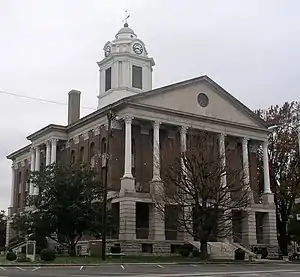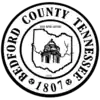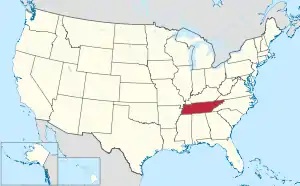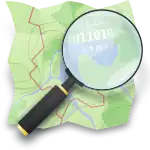Bedford County, Tennessee
Bedford County is a county located in the U.S. state of Tennessee. As of the 2020 census, the population was 50,237.[3] Its county seat is Shelbyville.[4] Bedford County comprises the Shelbyville, TN Micropolitan Statistical Area, which is also included in the Nashville-Davidson-Murfreesboro, TN Combined Statistical Area.
Bedford County | |
|---|---|
 Bedford County courthouse in Shelbyville | |
 Seal | |
 Location within the U.S. state of Tennessee | |
 Tennessee's location within the U.S. | |
| Coordinates: 35°31′N 86°28′W | |
| Country | |
| State | |
| Founded | December 7, 1807[1] |
| Named for | Thomas Bedford[2] |
| Seat | Shelbyville |
| Largest city | Shelbyville |
| Area | |
| • Total | 475 sq mi (1,230 km2) |
| • Land | 474 sq mi (1,230 km2) |
| • Water | 1.2 sq mi (3 km2) 0.2% |
| Population (2020) | |
| • Total | 50,237 |
| • Density | 105.99/sq mi (40.92/km2) |
| Time zone | UTC−6 (Central) |
| • Summer (DST) | UTC−5 (CDT) |
| Congressional district | 4th |
| Website | www |
History
The county was created in 1807 when the citizens of Rutherford County living south of the Duck River and the Stones River successfully petitioned the governor to split Rutherford County in two. The new county was named after American Revolutionary War officer and large landowner in the area, Thomas Bedford.
Once the state's largest and most populous county, Bedford County's size (in terms of area) has been steadily reduced since 1809 to form Coffee County, Moore County, Lincoln County, and Marshall County.[5]
The county was pro-Confederate during the Civil War, but Shelbyville was mostly loyal to the Union.
Texas pioneer William Whitaker Reed was born in Bedford County in 1816.[6]
Geography
According to the U.S. Census Bureau, the county has a total area of 475 square miles (1,230 km2), of which 474 square miles (1,230 km2) is land and 1.2 square miles (3.1 km2) (0.2%) is water.[7]
Adjacent counties
- Rutherford County (north)
- Coffee County (east)
- Moore County (southeast)
- Lincoln County (south)
- Marshall County (west)
State protected areas
- Normandy Wildlife Management Area (part)
Demographics
| Census | Pop. | Note | %± |
|---|---|---|---|
| 1810 | 8,242 | — | |
| 1820 | 16,012 | 94.3% | |
| 1830 | 30,396 | 89.8% | |
| 1840 | 20,546 | −32.4% | |
| 1850 | 21,511 | 4.7% | |
| 1860 | 21,584 | 0.3% | |
| 1870 | 24,333 | 12.7% | |
| 1880 | 26,025 | 7.0% | |
| 1890 | 24,739 | −4.9% | |
| 1900 | 23,845 | −3.6% | |
| 1910 | 22,667 | −4.9% | |
| 1920 | 21,737 | −4.1% | |
| 1930 | 21,077 | −3.0% | |
| 1940 | 23,151 | 9.8% | |
| 1950 | 23,627 | 2.1% | |
| 1960 | 23,150 | −2.0% | |
| 1970 | 25,039 | 8.2% | |
| 1980 | 27,916 | 11.5% | |
| 1990 | 30,411 | 8.9% | |
| 2000 | 37,586 | 23.6% | |
| 2010 | 45,058 | 19.9% | |
| 2020 | 50,237 | 11.5% | |
| U.S. Decennial Census[8] 1790-1960[9] 1900-1990[10] 1990-2000[11] 2010-2014[3] | |||

2020 census
| Race | Number | Percentage |
|---|---|---|
| White (non-Hispanic) | 36,499 | 72.65% |
| Black or African American (non-Hispanic) | 3,563 | 7.09% |
| Native American | 127 | 0.25% |
| Asian | 337 | 0.67% |
| Pacific Islander | 13 | 0.03% |
| Other/Mixed | 2,033 | 4.05% |
| Hispanic or Latino | 7,665 | 15.26% |
As of the 2020 United States census, there were 50,237 people, 17,029 households, and 12,704 families residing in the county.
2000 census
As of the census of 2000, there were 37,586 people, 13,905 households, and 10,345 families residing in the county. The population density was 79 people per square mile (31 people/km2). There were 14,990 housing units at an average density of 32 per square mile (12/km2). The racial makeup of the county was 86.84% White, 11.48% Black or African American, 0.28% Native American, 0.45% Asian, 0.05% Pacific Islander, 2.73% from other races, and 1.16% from two or more races. 7.48% of the population were Hispanic or Latino of any race.
There were 13,905 households, out of which 34.00% had children under the age of 18 living with them, 57.30% were married couples living together, 11.90% had a female householder with no husband present, and 25.60% were non-families. 21.50% of all households were made up of individuals, and 9.20% had someone living alone who was 65 years of age or older. The average household size was 2.67 and the average family size was 3.06.
In the county, the population was spread out, with 25.80% under the age of 18, 9.90% from 18 to 24, 29.70% from 25 to 44, 22.00% from 45 to 64, and 12.70% who were 65 years of age or older. The median age was 35 years. For every 100 females there were 98.40 males. For every 100 females age 18 and over, there were 97.00 males.
The median income for a household in the county was $36,729, and the median income for a family was $33,691. Males had a median income of $25,485 versus $15,673 for females. The per capita income for the county was $13,698. About 12.70% of families and 25.10% of the population were below the poverty line, including 15.90% of those under age 18 and 17.80% of those age 65 or over.
Communities
City
- Shelbyville (county seat)
Towns
Census-designated place
Unincorporated communities
- Branchville
- Bugscuffe
- Center Grove
- Cortner's Station
- Fairfield
- Fall Creek
- Flat Creek
- Haley's Station
- Hawthorne
- Mount Harmond
- Palmetto
- Pleasant Grove
- Poplin's Crossroads
- Raus
- Richmond
- Roseville
- Rover
- Wheel
Politics
| Year | Republican | Democratic | Third party | |||
|---|---|---|---|---|---|---|
| No. | % | No. | % | No. | % | |
| 2020 | 14,354 | 75.20% | 4,453 | 23.33% | 281 | 1.47% |
| 2016 | 11,486 | 74.80% | 3,395 | 22.11% | 474 | 3.09% |
| 2012 | 10,034 | 69.46% | 4,211 | 29.15% | 200 | 1.38% |
| 2008 | 10,217 | 65.89% | 5,027 | 32.42% | 263 | 1.70% |
| 2004 | 8,351 | 60.93% | 5,268 | 38.44% | 87 | 0.63% |
| 2000 | 5,911 | 48.42% | 6,136 | 50.27% | 160 | 1.31% |
| 1996 | 4,634 | 41.07% | 5,735 | 50.82% | 915 | 8.11% |
| 1992 | 3,836 | 33.59% | 5,978 | 52.34% | 1,607 | 14.07% |
| 1988 | 4,856 | 54.32% | 4,046 | 45.26% | 37 | 0.41% |
| 1984 | 4,699 | 50.55% | 4,499 | 48.40% | 98 | 1.05% |
| 1980 | 3,377 | 35.24% | 5,987 | 62.48% | 219 | 2.29% |
| 1976 | 3,023 | 29.19% | 7,228 | 69.79% | 106 | 1.02% |
| 1972 | 4,262 | 59.73% | 2,565 | 35.95% | 308 | 4.32% |
| 1968 | 1,870 | 22.30% | 2,416 | 28.81% | 4,099 | 48.88% |
| 1964 | 2,272 | 28.83% | 5,610 | 71.17% | 0 | 0.00% |
| 1960 | 2,633 | 36.81% | 4,457 | 62.32% | 62 | 0.87% |
| 1956 | 2,258 | 33.08% | 4,517 | 66.18% | 50 | 0.73% |
| 1952 | 2,611 | 37.44% | 4,362 | 62.56% | 0 | 0.00% |
| 1948 | 771 | 17.93% | 2,393 | 55.64% | 1,137 | 26.44% |
| 1944 | 733 | 21.51% | 2,651 | 77.81% | 23 | 0.68% |
| 1940 | 555 | 18.05% | 2,499 | 81.29% | 20 | 0.65% |
| 1936 | 514 | 17.36% | 2,428 | 82.00% | 19 | 0.64% |
| 1932 | 630 | 21.74% | 2,264 | 78.12% | 4 | 0.14% |
| 1928 | 1,405 | 47.84% | 1,532 | 52.16% | 0 | 0.00% |
| 1924 | 925 | 33.23% | 1,799 | 64.62% | 60 | 2.16% |
| 1920 | 2,056 | 48.51% | 2,182 | 51.49% | 0 | 0.00% |
| 1916 | 1,324 | 33.92% | 2,578 | 66.05% | 1 | 0.03% |
| 1912 | 1,474 | 37.98% | 2,305 | 59.39% | 102 | 2.63% |
Education
Bedford County School District operates nine elementary schools, four middle schools, and three high schools, in Shelbyville (Shelbyville Central High School), Bell Buckle (Cascade High School), and Unionville (Community High School).[15]
See also
References
- Timothy Marsh and Helen C. March, "Bedford County," Tennessee Encyclopedia of History and Culture. Retrieved: 31 March 2013.
- "Origins of Tennessee County Names" (PDF). Tennessee Secretary of State. Retrieved April 5, 2021.
- "Bedford County, Tennessee". quickfacts.census.gov. United States Census Bureau. Retrieved August 29, 2021.
- "Find a County". National Association of Counties. Archived from the original on July 12, 2012. Retrieved June 7, 2011.
- "Bedford County History". www.bedfordcountytn.org. Retrieved March 24, 2019.
- Brochure "William Whitaker Reed House", 1850, Visitor's Center, Salado, Texas
- "2010 Census Gazetteer Files". United States Census Bureau. August 22, 2012. Retrieved April 1, 2015.
- "U.S. Decennial Census". United States Census Bureau. Archived from the original on April 26, 2015. Retrieved April 1, 2015.
- "Historical Census Browser". University of Virginia Library. Retrieved April 1, 2015.
- Forstall, Richard L., ed. (March 27, 1995). "Population of Counties by Decennial Census: 1900 to 1990". United States Census Bureau. Retrieved April 1, 2015.
- "Census 2000 PHC-T-4. Ranking Tables for Counties: 1990 and 2000" (PDF). United States Census Bureau. April 2, 2001. Archived (PDF) from the original on October 9, 2022. Retrieved April 1, 2015.
- Based on 2000 census data
- "Explore Census Data". data.census.gov. Retrieved December 24, 2021.
- Leip, David. "Dave Leip's Atlas of U.S. Presidential Elections". uselectionatlas.org. Retrieved March 9, 2018.
- "Schools". Bedford County School District. Retrieved April 7, 2019.
External links
 Media related to Bedford County, Tennessee at Wikimedia Commons
Media related to Bedford County, Tennessee at Wikimedia Commons Geographic data related to Bedford County, Tennessee at OpenStreetMap
Geographic data related to Bedford County, Tennessee at OpenStreetMap- Bedford County at Curlie
- Bedford County, TNGenWeb - free genealogy resources for the county
- Shelbyville Mainstreet